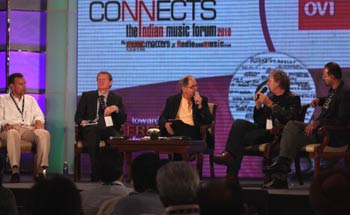MUMBAI: Cracking royalties has been a challenge for the musicians of our country since long now, but there are some core issues with the way the Indian music industry functions which presents a problem in the collection of dues. How can we bring in the moolah to make the industry more profitable was discussed in one of the sessions at Nokia Music Connects on day one.
How can musicians get their hands on the much deprived performance and synchronization rights and administration along with identifying publishing royalties and income stream opportunities?
The session moderated by Ralph Simon included panelists like Universal Music Publishing’s Achille Forler, Frank Liwall from The Royalty Network Inc, The Orchard’s Prashant Bahadur, and Simon Long from Collins Long.
The panel started with relating the example of Sound Exchange in US which was set up specially to try and capture money that should be paid by ISP’s, television, FM radios that are using the music. The body has collected 500 million dollars to be distributed to composers and publishing companies but have been unable to dispose the money because of the lack of clarity on who should be paid as there was a lack of data.
Gliding towards the Indian perspective, the panelists stressed on the fact that musicians should register each and every work that they produce so that they get a share in the royalties. They were also staggered by the sheer fact that there is no concept of a cue sheet in India which internationally is the backbone of all musical work done.
Explaining the concept of cue sheet Achilee said, “A cue sheet is a document that lists all of the musical elements of an audio/visual program. Internationally, ASCAP uses cue sheets to determine to whom it needs to distribute performance royalties. If your music is used in a film or television program, filing a cue sheet is an important step in getting paid
for your work and getting royalties.”
Due to the rapidly changing landscape of television and film production, there is a growing number of independent production companies that may not be aware of the importance of filing a music cue sheet. It has become increasingly important for composers, publishers and other music professionals to educate the production companies with which they work about
what a cue sheet is so that they get their rightful due.
Simon who represents A R Rahman internationally threw further light on this, “We have been long associated but it is only in the last couple of years that we have spoken about cue sheets. I was astounded that such a big music director did not know about such a basic fact. Unless there is a cue sheet the registered work is of no use when it is played on television, radio or elsewhere.”
Forler also mentioned how big production houses in the country including Dharma Productions and YashRaj Films are clueless about this concept. “The concept of cue sheets is regretfully unknown in India because of which a hefty amount of money is lost.”
Prashant Bahadur further touched on the topic of metadata, “Non-availability of clean meta data is one the biggest challenge. The documentation should be right and supplying information should be accurate only then will all the parties get their dues. Sometimes the owner does not come to take the money which otherwise a body like Sound Exchange is ready to give away.”
Bahadur also talked further about ISRC. “ISRC codes is a singular identifier of the master recording of the song, they are assigned to songs and encoded onto a CD for tracking purposes as well as royalties. Each song has a unique code but there are times multiple ISRCs are given for the same song, becomes a challenge to pay the rightful owner.”
Liwall provided a piece of advice to composers and publishers whose music travels abroad. He said, “I recommend having a publisher who knows the system of the country and can look after your material on ground. Make sure your songs are properly registered, the cue sheet is properly maintained. In some countries a cue sheet is required as a part of getting registered. All this work has to be done in order to claim the money.
The panel also added that in future if the composers want to protect their rights and get the moolah in their pocket they need to provide with the correct metadata and cue sheets. Bad information given in will lead to bad information being given out.
It also talked about tapping the much larger market that is out there. Added Bahadur, “Create music out here and package it differently to suit western aesthetics, provide it with a right title and your audience will double….
He further gave an example of Bhangra music and its usage abroad, “Repackage Bhangra music as fitness content something which is already been happening in some pockets of the world, as see it reaching to a different audience. It is important to reformulate the way you display your music.”
“Your music has no longer be limited to the Asian diaspora, Jai ho proved how music can be popular across everywhere,” added Simon. On a concluding note Forler added, “Register your work within the country. Also a lot of curiosity is raised internationally about Indian music. It is a positive sign that in future days the country has a lot more to provide.”
